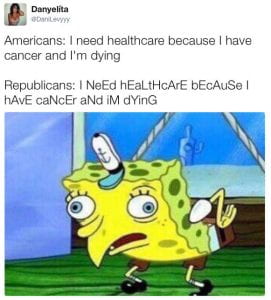The Alt-Right’s use of Pepe the frog felt like an incredibly strange moment in time, an indistinctive, passing headline at the blurry fringes of my technological vision. It was what felt like a ridiculous appropriation of a formerly light internet meme, and there were what felt like larger issues to focus on at that time. It would be safe to assume this was the thought for many people, especially in a tumultuous period of time like the 2016 presidential election. However, “The Cult of Kek,” as the Southern Poverty Law Center details, was of a much larger scale than I knew.
The SPLC, as well as Paul Spencer of Vice, explains that connecting the crudely-drawn cartoon frog to a coincidental frog diety of chaos allowed the Alt-Right community to perpetuate two of their favorite tactics: trolling liberals and fighting what they perceive to be the politically correct status quo. This is a group of people that fancies themselves to be “agents of chaos,” not unlike the toxic group of masculinity-seeking men in Chuck Palahniuk’s (oft-misunderstood) Fight Club. By extension, the meme was attributed to the political candidate that the Alt-Right rallied behind, the candidate they believed would best fulfill their desired, PC-less ideals—Donald Trump. In attributing the meme to an actual deity and to an actual, real-life idol, the group was then able to craft an entire religious system and story around their symbol Kek.
Possibly somewhat serious, likely the work of very committed trolls, definitely all-confusing, the group’s use of the meme was an extreme version of a common method of meme-usage today. Many people create and share memes on various topics across social media platforms, image- and text-based content that they relate to their individual lives and experiences. Memes exist in a shared, paradoxical space as well. Both individuals and collective groups utilize memes as a means of expressing opinions in a cartoonish way, giving power to symbols that would otherwise seem ridiculous. Despite the goofiness of the medium, much of the sociopolitical content expressed through the use of memes can contain some serious, succinct commentary. Meme-ing is a special variety of languages that only members of certain communities can understand.
One large and mostly recent example was the wildfire meme known as “Mocking Spongebob.” According to Know Your Meme, this meme began with an image from the 2012 “Little Yellow Book” episode of Spongebob Squarepants. As you can see in the examples of the meme below, it consists of a beloved cartoon character positioned like a chicken. Know Your Meme explains the origins of the meme, a screenshot from a Twitter user, that then grew in popularity and was re-formatted to mock statements of opinion using a line of stated text that is then repeated in varying lowercase and capital letters. Although it is hard to name the sing-song tone of the mocking sentences, it is a tone that many viewers can identify perfectly in their heads (think of a younger sibling, repeating your words back at you in a voice totally different than your own to frustrate you as much as possible).
Know Your Meme shows that one of the most popular initial iterations of this meme is the following political statement:
While the same Spongebob image was used differently before this, this was the first recorded version of the meme with all of its popularized, current features. Perhaps frustration that many millennials feel within the existing system is what skyrocketed this particular iteration to infamy. In my personal experience, I have largely seen this meme used in various contexts, but especially have seen it used as a more critical sociopolitical medium, perhaps because it fell into the Internet’s lap at a time of great political upheaval and divisive, internet-fueled sociopolitical opinions.
The Mocking Spongebob meme is one of many memes often used as a method of making a point about politics or society. Often, I have seen this meme used by those on the left side of the political spectrum at the expense of those on the right (please view more examples below, including a pretty scary-looking Trump version). While the left’s use of this meme and others does not espouse any harm towards groups of people, it is interesting that it mimics the childish, mocking tone of memes like Kek, often to poke fun at and heckle the other side of the aisle. Is this a kind of metacommentary on alt-right trolling, or simply another group displaying similar frameworks for very different ideaologies?
While the left is not mock-worshipping any one symbol, the function and tone of the associated discourse it worth examining. Does the use of jokes to express opinions hurt a cause? Does the lack of devotion, the atheistic following, and the nature of the critiques within the meme itself elevate the use of memes as a medium, or does the nature of the medium itself simply maintain a certain level of immaturity that gouges the purpose? As the use of memes as commentary only grows, these questions will remain relevant. Many political candidates have even become comfortable with utilizing memes in the social media campaigning to appeal to different voters, which begs a slew of other questions.
It is safe to say that meme culture it not going away. It is possible that Mocking Spongebob, down in popularity, could even have a meme renaissance (much like Pepe, though ideally for different reasons)—he is a figure of millennial nostalgia if nothing else. It will be interesting to see if sociopolitical commentary within memes will continue past the Trump era, or if is simply a symptom of a larger disease.





